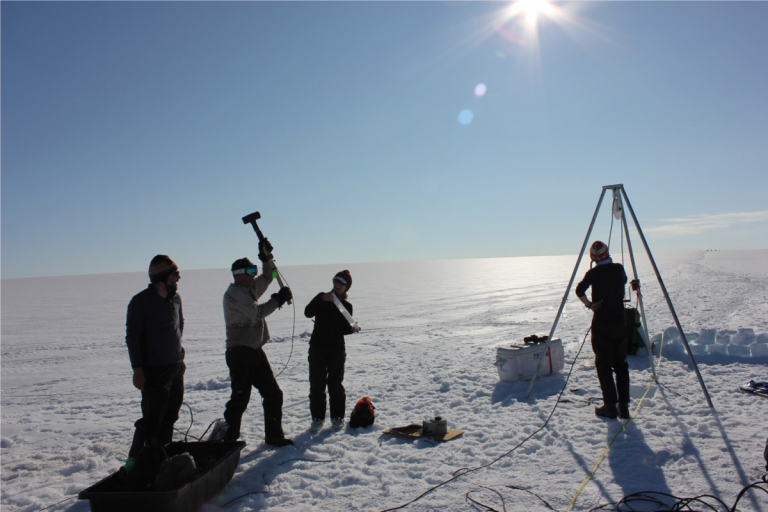
There has never been a better or more important time to consider a career in earth sciences and engineering. Today, we face major global challenges associated with climate change, the utilization of natural resources, environmental degradation and remediation, energy development and sustainability.
Earth scientists and engineers stand at the forefront of addressing the world’s most complex issues, seeking to understand the origin, transformation, and responsible use of our planet, including everything from its geology, atmosphere, and extensive bodies of water, while urging us to examine the relationship between us and the world’s most crucial finite elements.
Earth science is inherently interdisciplinary, drawing on many areas of science, engineering, and even the humanities. Consequently, this diverse discipline allows us to interpret the intricate ways in which our planet was born and continues to evolve in the face of both natural and human-led activities.
“The future of our planet and its over 7 billion inhabitants depends on knowledge of how the earth works, and especially how evidence-based scientific knowledge and technology inform public policy,” says Barbara Nash, Professor of Geology and Geophysics.
“In this era of globalization, scientists and engineers have access to whole new levels of data about the earth and earth processes,“ the Professor says. “With its focus on both basic science and engineering, the College of Mines and Earth Sciences is uniquely situated to address these emerging and complex problems of the environment and energy resources, and in so doing, the College provides a pathway to improving the quality of lives of all of us.”

Image courtesy of The University of Utah
The University of Utah is a PAC-12 university that sits at the base of the Wasatch Mountains, just minutes from a wealth of recreational and cultural opportunities. By virtue of the spectacular surrounding geology and wide range of climates that cover everything from desert through to mountain, the institution’s College of Mines and Earth Sciences (CMES) sits in the middle of one of the world’s great natural laboratories for the study of geology, natural resource management, and metropolitan and mountain meteorology.
This unique College bridges the interface between the earth sciences and the many fields of engineering, offering a breadth and depth of exciting research and educational experiences with eighteen accredited undergraduate and graduate degrees in the fields of Earth Science, Atmospheric Sciences, Geology and Geophysics, Geological Engineering, Mining Engineering, and Metallurgical Engineering.
Working alongside a world-renowned Faculty, Utah students have the chance to explore issues associated with energy resources and security, advanced manufacturing, critical and geological materials, air quality and health, natural and anthropogenic hazards, resource management and sustainability, as well as global change – past, present and future.
Today’s students are heavily involved in projects such as monitoring of seismic activity in the western U.S. (including Yellowstone National Park), dinosaur ecology, prediction of mountain, desert and extreme weather events, managing and protecting earth’s resources (particularly water and critical materials), protecting endangered species through isotope forensics, and improving the safety, sustainability, and environmental protections associated with the global mining and exploration industries.
Both the College and the University at large have invested in this critical work through recent initiatives like the Global Change and Sustainability Center, the Roger and Dawn Crus Center for Renewable Energy, the Water and Air Science and Technology for Community Health (WASATCH) Environmental Observatory, the Environmental Analytical Research for Transformative Health (EARTH) core facility, not to mention the Department of Energy’s REMADE Institute for clean energy, and recycling and reuse of materials.
These new centers harbor state-of-the-art capabilities, supporting innovative, interdisciplinary research programs and student experiences in earth and advanced materials, forensic sciences, biochemistry, pharmacology, isotope medicine, atmospheric chemistry, human evolution, ecology and anthropology.

Image courtesy of The University of Utah
Located in Salt Lake City, the University boasts a vibrant, diverse and growing global community, where cost of living is relatively low compared to many other US metropolitan regions. Graduate students who are accepted onto Utah’s MS or PhD programs typically receive a competitive stipend or fellowship and pay no tuition, while undergraduate students can find many scholarship and paid research opportunities to help cover the costs of their education.
As a dynamic, research-focused institution, Utah’s College of Mines and Earth Sciences welcomes international students from every culture and background, dedicating itself to providing students with a safe, secure and supportive learning environment. Here, students come from all over the world, with over 130 countries making their mark on campus.
At the University of Utah, you’re guaranteed to feel safe and valued, while the College ensures you access to the cutting-edge resources you need in order to succeed. Graduates of the College go on to forge highly impactful careers, often with a powerful international focus. So, it’s time to dig in to the lifestyle and culture on offer at Utah’s College of Mines and Earth Sciences. For all you know, it could change your life…and you might change the world.
Follow Utah’s College of Mines and Earth Sciences on Facebook, Twitter and Instagram
Liked this? Then you’ll love these…
Global leaders in Sustainability, Agriculture and Environmental Sciences
4 elite Mining Colleges that prepare graduates for success in the global market







